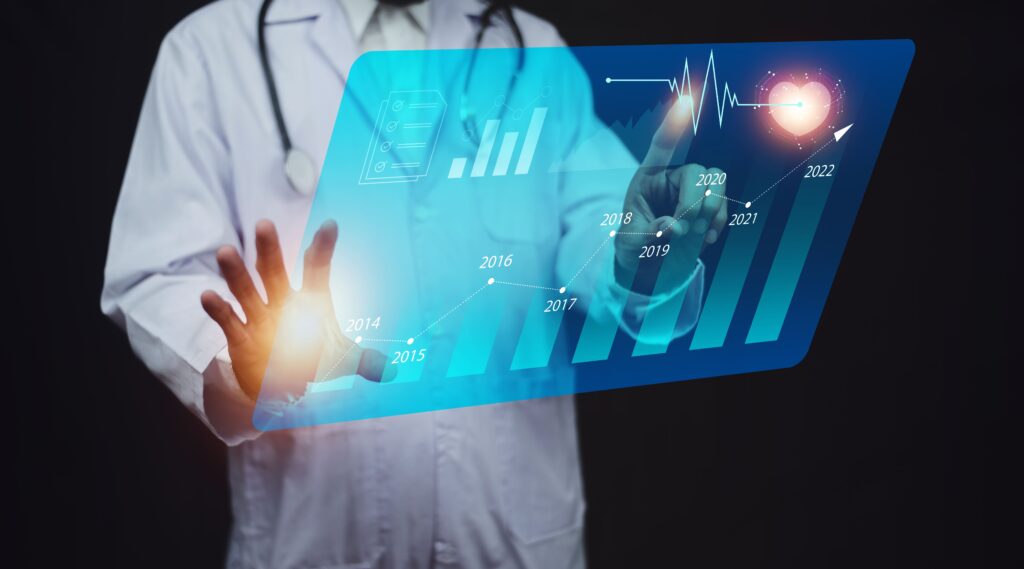AI in healthcare is revolutionizing patient care. This article explores specific AI in healthcare examples—like AI-driven medical imaging, virtual health assistants, and predictive analytics—that are enhancing diagnostics, personalizing treatments, and improving patient outcomes.
Key Takeaways
– AI is revolutionizing healthcare through applications in medical imaging, virtual health assistants, drug discovery, and predictive analytics, leading to improved patient outcomes.
– Innovations such as natural language processing and machine learning enhance clinical decision support systems and enable personalized treatment plans tailored to individual patients.
– The future of AI in healthcare promises greater access and efficiency, but it requires addressing legal, ethical, and implementation challenges to fully realize its potential.
AI in Medical Imaging

AI is making waves in the field of medical imaging, significantly enhancing the accuracy and efficiency of diagnosing diseases. One of the most groundbreaking applications is the use of AI algorithms to outperform radiologists in detecting conditions like pneumonia. This isn’t just about replacing human intelligence but augmenting it to achieve improved patient outcomes.
Automated classification of medical images is at the forefront of AI in healthcare. Machine learning techniques enable the extraction of complex features from diverse imaging modalities, which helps to analyze medical images and ensures accurate segmentation of critical structures in medical images. This is particularly beneficial for targeted treatment planning, ensuring that medical practitioners can focus on the most critical areas.
Generative adversarial networks (GANs) are another fascinating AI technology in medical imaging. GANs can create synthetic medical images, which are invaluable for training AI models. These synthetic images supply extensive data, refining AI algorithms to enhance their accuracy and reliability.
Deep learning algorithms have also made significant strides in detecting abnormalities in medical images. These algorithms can spot hidden patterns that might be missed by the human eye, leading to better patient outcomes. Integrating AI tools into medical practices allows healthcare providers to support medical decision-making and enhance patient care.
In essence, AI in medical imaging is not just about technology; it’s about transforming how medical professionals diagnose and treat patients. AI enhances human intelligence, paving the way for precision medicine and better patient outcomes.
Virtual Health Assistants
Virtual health assistants are another exciting application of AI in healthcare, providing 24/7 support and monitoring to enhance patient engagement. These AI-powered assistants can perform a variety of functions, including:
– Identifying underlying health issues
– Providing medical advice
– Reminding patients to take their medication This continuous engagement is crucial for managing chronic conditions and ensuring better health outcomes.
One of the most compelling aspects of virtual health assistants is their ability to build trust with users. Benefits include:
– Patients are more likely to open up about sensitive health topics when interacting with a virtual assistant.
– This openness can lead to more accurate diagnoses and personalized treatment plans.
– These assistants can engage users with tailored advice and motivation.
-They adapt to individual health goals.
Looking ahead, the landscape of health care may involve autonomous virtual health assistants providing anticipatory care. These assistants could predict potential health issues before they become severe, allowing for timely interventions. However, to ensure their effectiveness, virtual health assistants must adhere to health care values and regulatory standards.
Healthcare organizations, including the National Health Service (NHS), are increasingly integrating virtual health assistants into their health systems. This approach not only improves patient care but also eases the burden on healthcare professionals. These AI tools support healthcare workers by handling routine tasks, allowing medical professionals to focus on more complex and critical aspects of patient care in the healthcare sector, as recommended by the World Health Organization.
In summary, virtual health assistants are transforming the healthcare industry by providing continuous, personalized support to patients. They enhance healthcare delivery, improve patient outcomes, and support healthcare professionals in their daily tasks.
AI in Drug Discovery

AI is revolutionizing the drug discovery process, making it faster, more efficient, and more precise. One of the most significant advancements is the ability of AI to design novel compounds with targeted properties. By analyzing vast datasets, AI applications have successfully identified new cancer treatment compounds. This represents a significant leap forward in personalized medicine, where treatments can be tailored to individual patients based on their unique genetic makeup.
AI also plays a crucial role in predicting drug-drug interactions, which is vital for improving personalized medicine approaches. AI tools enable researchers to optimize clinical trial processes by providing insights from data to identify trends and adverse drug reactions. This not only speeds up the drug development process but also enhances the safety and efficacy of new treatments.
Deep learning models have been developed to predict the efficacy of drug compounds based on their biological activity. These models use machine learning techniques to analyze complex biological data, leading to more accurate predictions and better treatment outcomes. Collaboration between AI researchers and pharmaceutical scientists further enhances the accuracy of drug candidate predictions.
Integrating AI with traditional methods can significantly improve the overall efficiency of the drug discovery process. Combining human intelligence with AI technologies allows researchers to achieve better results more quickly. This collaborative approach ensures that new drugs are developed more quickly and safely, ultimately benefiting patients.
In conclusion, AI is transforming drug discovery by enhancing the precision and speed of the process. By leveraging AI tools, researchers can design better treatments, optimize clinical trials, and improve patient outcomes.
Natural Language Processing in EHRs
Natural language processing (NLP) is a branch of AI that enables computers to interpret and use human language, and it is increasingly being utilized in healthcare to derive clinical insights from electronic health records (EHRs). NLP can:
– Extract useful information for accurate diagnosis from medical records
– Analyze unstructured patient data to identify mental health issues
– Aid in diagnosis
However, implementing NLP in EHRs comes with its own set of challenges. Issues such as a lack of annotated data, diverse data sources, and limited interoperability can limit the full potential of NLP in healthcare. Addressing these challenges is crucial for enhancing clinical decision-making and improving patient care.
One way to overcome these challenges is by improving machine learning models and integrating healthcare data sources. This method allows healthcare providers to gain more accurate and actionable insights from patient data and medical data. This can lead to better diagnoses, more effective treatments, and ultimately, better patient outcomes.
Healthcare providers are increasingly relying on NLP to streamline clinical practice and improve patient care. By analyzing patient data, NLP can provide valuable insights that support healthcare professionals in making informed decisions. This not only enhances the efficiency of healthcare delivery but also improves patient outcomes.
In summary, NLP in EHRs is a powerful tool that can transform healthcare by providing valuable clinical insights. By addressing the challenges and improving the technology, healthcare providers can leverage NLP to enhance patient care and improve health outcomes.
Predictive Analytics for Population Health Management
Predictive analytics is a powerful tool in population health management, enabling healthcare providers to identify health trends and predict potential health risks. AI models continuously analyze patient data, helping to identify vulnerable patient groups and enabling targeted outreach and interventions.
Evaluating historical and current health data allows predictive analytics to inform effective health initiatives. This proactive approach can significantly reduce healthcare costs by improving patient triage and minimizing hospitalizations. Continuous remote monitoring, supported by AI, decreases the likelihood of complications and hospital readmissions.
AI can also improve preventive care by identifying individuals at higher risk for diseases based on genetic and lifestyle data. This allows healthcare providers to implement early interventions, improving patient outcomes and reducing the burden on healthcare systems.
Predictive analytics is particularly effective in identifying patients at risk for readmission. Analyzing demographics and medical history enables AI to predict patient readmissions, facilitating targeted interventions to improve care and reduce costs.
Integrating AI in population health management provides real-time insights and optimizes medication choices. This not only enhances patient care but also supports healthcare providers in improving health outcomes and making informed decisions.
In conclusion, predictive analytics is a valuable tool in population health management, helping to identify risks, improve care, and reduce costs.
Remote Patient Monitoring
Remote patient monitoring is another area where AI is making a significant impact. AI enhances remote monitoring by identifying patients at risk and providing timely care. This is particularly important for chronically ill patients who require continuous monitoring to manage their conditions effectively.
One example of AI in remote patient monitoring is Emerald, which uses wireless touchless sensors and machine learning to monitor patients remotely. These sensors can provide real-time health metrics, allowing healthcare providers to track vital signs and detect any abnormalities.
Wearable devices are also playing a crucial role in remote patient monitoring. Data collected from these devices allow AI to enhance the personalization of treatment plans. This ensures that patients receive the most appropriate care based on their unique health metrics.
Remote patient monitoring significantly improves patient outcomes by providing continuous care and reducing the likelihood of complications and hospital readmissions. It also enhances patient safety by allowing healthcare providers to intervene quickly when necessary.
In summary, AI is revolutionizing remote patient monitoring by providing real-time health metrics and personalized treatment plans. This not only improves patient outcomes but also enhances patient safety and reduces healthcare costs.
Precision Medicine and Personalized Treatment Plans
AI technologies are enhancing the ability to create tailored treatment plans by analyzing diverse patient data. This is the essence of precision medicine, where treatments are customized to the individual patient’s genetic makeup, lifestyle, and other factors.

One of the key benefits of AI in precision medicine includes:
– Identification of new biomarkers and therapeutic targets.
– Uncovering previously hidden insights by analyzing vast amounts of data, leading to more effective treatments.
– Using machine learning to predict treatment responses and side effects, further enhancing personalized treatment plans.
AI algorithms can monitor treatment outcomes in real time, enabling:
– Ongoing refinement of patient-specific treatment plans.
– Continuous learning from AI systems that allows dynamic adjustment of treatment plans based on patient responses.
– Constant optimization of treatments to achieve the best possible outcomes.
AI’s role in precision medicine could shift healthcare from reactive to proactive patient management. Predicting potential health issues and intervening early allows healthcare providers to improve patient outcomes and reduce the burden on healthcare systems.
In conclusion, AI is transforming precision medicine by enabling the creation of personalized treatment plans. This not only improves patient outcomes but also shifts healthcare towards a more proactive approach.
AI in Genomic Medicine
AI is enhancing genomic medicine by significantly reducing the time and costs involved in genome sequencing. This scalability allows for the processing of vast datasets, leading to discoveries of rare genetic variants that impact treatment responses.
Machine learning algorithms are instrumental in identifying genetic variations associated with disease diagnosis more accurately and promptly. This is crucial for diagnosing and treating chronic genetic conditions, as AI can provide predictive modeling that informs personalized treatment plans.
AI also aids in personalizing medicine by analyzing genomic data to tailor treatments based on individual genetic profiles. This means that patients receive treatments that are specifically designed to work best for them, ai solutions improving patient outcomes and reducing adverse effects.
AI techniques facilitate the integration of diverse data types, including clinical, genomic, and environmental data. This comprehensive approach leads to more accurate and actionable insights, ultimately enhancing patient care as we integrate AI with the use of an ai system and an ai model.
In summary, AI is revolutionizing genomic medicine by enabling faster, more accurate, and more personalized treatments. This not only improves patient outcomes but also advances our understanding of genetic diseases.
Enhancing Clinical Decision Support Systems
Clinical decision support systems (CDSS) are crucial in providing healthcare providers with essential knowledge and tools to make informed decisions. AI is currently utilized in healthcare for clinical decision support, helping clinicians by retrieving patient histories and assisting with documentation. This not only enhances the efficiency of healthcare delivery but also improves patient outcomes.
Machine learning algorithms play a significant role in enhancing predictive analytics. These algorithms can accurately predict drug toxicity and treatment outcomes, providing valuable insights that support medical decision-making. The development of predictive models relies on a combination of technology, data, and human insights.
For physicians to trust AI systems in healthcare, transparency in decision-making and validation through up-to-date medical research are essential. AI systems must ensure accurate recommendations tailored to individual patients to maintain patient safety and support medical decisions. This trust is crucial for the widespread adoption of AI in clinical practice.
AI systems will assist doctors in the future by suggesting diagnoses, tests, and medications during patient visits. This not only saves clinicians time but also allows for more direct patient care. By streamlining processes and enhancing clinical decision-making, artificial intelligence in healthcare is transforming healthcare delivery.
In conclusion, AI is enhancing clinical decision support systems by providing valuable insights, improving predictive analytics, and ensuring accurate recommendations. This not only supports healthcare professionals but also improves patient outcomes and safety
AI in Mental Health Support
Artificial intelligence can assist in identifying individuals at high risk for mental health disorders and offer timely interventions. This is particularly important in a field where early detection and intervention can significantly improve patient outcomes. AI tools can facilitate continuous monitoring and provide insights into behaviors and emotional states.
AI algorithms provide healthcare providers with a deeper understanding of a patient’s mental health, enabling more personalized and effective treatments. This continuous monitoring is crucial for managing chronic mental health conditions and ensuring better patient outcomes.
In summary, AI is making significant strides in mental health support by providing continuous monitoring and valuable insights. This not only improves patient care but also enables timely interventions that can significantly enhance mental health outcomes.
Improving Administrative Efficiency

AI is transforming healthcare administration by automating time-consuming, high-volume repetitive tasks. This includes:
– Scheduling
– Processing claims
– Billing These automations reduce administrative burdens and enhance operational efficiency. Additionally, the use of AI in billing processes enhances accuracy by flagging coding errors and potential denials before submission.
AI alleviates workforce shortages in healthcare by improving clinical decision-making and streamlining administrative processes. This not only reduces human error but also speeds up the review process of medical records, ultimately improving patient outcomes and operational efficiency. This demonstrates how ai is transforming the healthcare landscape.
Legal and Ethical Considerations
Existing laws like GDPR and HIPAA set standards for data privacy that AI applications in healthcare must comply with. AI systems must adhere to strict data protection laws to ensure patient information remains confidential and secure. Ethical and legal considerations complicate the integration of AI in healthcare, highlighting the need for clear guidelines.
Collaborative efforts among policymakers, technologists, and legal experts are necessary to create effective guidelines for AI deployment in healthcare, with human oversight being a crucial component. Key ethical principles in AI involve ensuring transparency, maintaining patient autonomy, and fostering fairness to avoid amplifying existing healthcare disparities.
Challenges such as potential biases in algorithms and the need for high-quality datasets must be addressed to ensure the ethical use of AI in healthcare. Addressing these challenges allows healthcare providers to leverage AI for improving patient outcomes while maintaining ethical standards.
Future Directions for AI in Healthcare
The potential of AI to transform the practice of medicine and healthcare delivery is enormous. AI could lead to more personalized, precise, predictive, and portable healthcare solutions. Benefits of AI in healthcare include:
– Advancements in medical research
– Drug development
– Clinical diagnoses
– Patient care
Effective AI systems are helping to significantly improve patient care and health outcomes. However, multiple challenges exist that could hinder the full implementation of AI in healthcare. Interconnected initiatives under the framework of the AI Act, EHDS, and PLD are addressing barriers to AI deployment in healthcare.
The transition of AI systems into mainstream healthcare system relies heavily on cloud computing capabilities to manage large data volumes. AI has the capability to democratize and standardize healthcare in the future by enabling better data sharing for enhanced insights.
In conclusion, the future of healthcare ai in healthcare is bright, with the potential to transform patient care, improve health outcomes, and make healthcare more accessible and efficient. Addressing challenges and leveraging benefits allows AI to significantly enhance the healthcare industry.
Summary
AI is revolutionizing healthcare by enhancing medical imaging, supporting virtual health assistants, accelerating drug discovery, and much more. These advancements are transforming patient care, making it more precise, efficient, and accessible. By leveraging AI tools, healthcare providers can improve patient outcomes and streamline healthcare delivery.
From predictive analytics for population health management to AI in genomic medicine, AI is making significant strides in various areas of healthcare. These technologies are not just improving patient care but also addressing critical challenges in the healthcare industry.
In summary, AI is a game-changer in healthcare, offering transformative solutions that enhance patient care and health outcomes. By embracing AI, healthcare providers can deliver better, more personalized care, ultimately making healthcare smarter and more human.

Leave a Reply